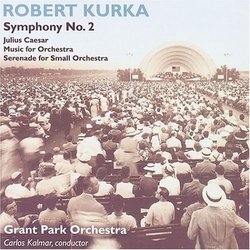| All Artists: Robert Kurka, Carlos Kalmar, Grant Park Orchestra Title: Robert Kurka: Symphony No. 2; Julius Caesar; Music for Orchestra; Serenade for Small Orchestra Members Wishing: 0 Total Copies: 0 Label: Cedille Release Date: 6/29/2004 Genre: Classical Styles: Opera & Classical Vocal, Symphonies Number of Discs: 1 SwapaCD Credits: 1 UPC: 675754742621 |
Search - Robert Kurka, Carlos Kalmar, Grant Park Orchestra :: Robert Kurka: Symphony No. 2; Julius Caesar; Music for Orchestra; Serenade for Small Orchestra
 | Robert Kurka, Carlos Kalmar, Grant Park Orchestra Robert Kurka: Symphony No. 2; Julius Caesar; Music for Orchestra; Serenade for Small Orchestra Genre: Classical
|
Larger Image |
CD Details |
CD ReviewsSo much hype over this derivative music? Larry VanDeSande | Mason, Michigan United States | 04/28/2005 (3 out of 5 stars) "Probably no classical CD produced in the past 12 months has been promoted as heavily as this collection of orchestral music by Robert Kurka,an American that died young -- age 35, 10 days short of 36.
Kurka lived in or near Chicago, making these performances by the Grant Park (Chicago) Orchestra somewhat special. This is also the orchestra that plays for the Chicago Lyric Opera which doubtless has produced his popular opera, "The Good Soldier Schweik". There has been one previous recording of his Symphony No. 2 from 1953. Two of the items on this CD -- "Julius Caesar: Symphonic Epilogue after Shakespeare" Op. 28 from 1955 and "Music for Orchestra" Op. 11 from 1949 -- are said to be world premieres. In addition, the CD says this is the first CD recording of his "Serenade for Small Orchestra" Op. 25 from 1954. A lot of critics went bonkers over this CD when Cedille sent it around. One called Kurka the most original of all American composers. Another said his Symphony No. 2 should be on the program of every American orchestra. I assume people were being paid to say these things because there is just about nothing original in this music. Kurka was a talented composer, there is no doubt about that. He could spin a theme and write fluently in sonata sytle with themes, development, exposition and recapping the whole thing at a coda. You can tell by listeing to this that his musical mind was supple. You can also tell he died so young he never developed whatever his own voice was going to become. Over and over, I hear far more than faint whispers of Sergei Prokofiev and Samuel Barber in this music. Later in the symphony I hear near direct quotations from Shostakovich. In the Serenade for Small Orchestra, I hear music that must have been based on Vaughan Williams' "Antartica" Symphony or the original film score from whence it came. In total, it is clear Kurka was overwhelmed by the music of two mid-century counterparts, Prokofiev and Barber. Like Prokofiev, Kurka overuses rapidly advancing military rhythms and blatty trumpets followed by moments of quiet strings disturbed by fluttering woodwinds. And like Barber, Kurka remained stubbornly tonal and romantic in mid-century while world composers were becoming increasingly dodecaphonic and cacaphonous. His Symphony No. 2 is so much like Prokofiev in the first two movements I wondered if I'd bought the worng CD by mistake. Then I wondered if I was listening to Shostakovich's 4th Symphony later on. All the while, I could hear Samuel Barber's orchestration and minor key drama. About half the time you can mistake the music on this CD for the score to a 1950s science fiction or film noir movie. At other times, it sounds like one of Leonard Bernstein's jazz-influenced compositions. So while there are good things herein, this composer's legacy is more analgam than a single independent voice. That is the lasting value of this particular CD. " |

 Track Listings (9) - Disc #1
Track Listings (9) - Disc #1